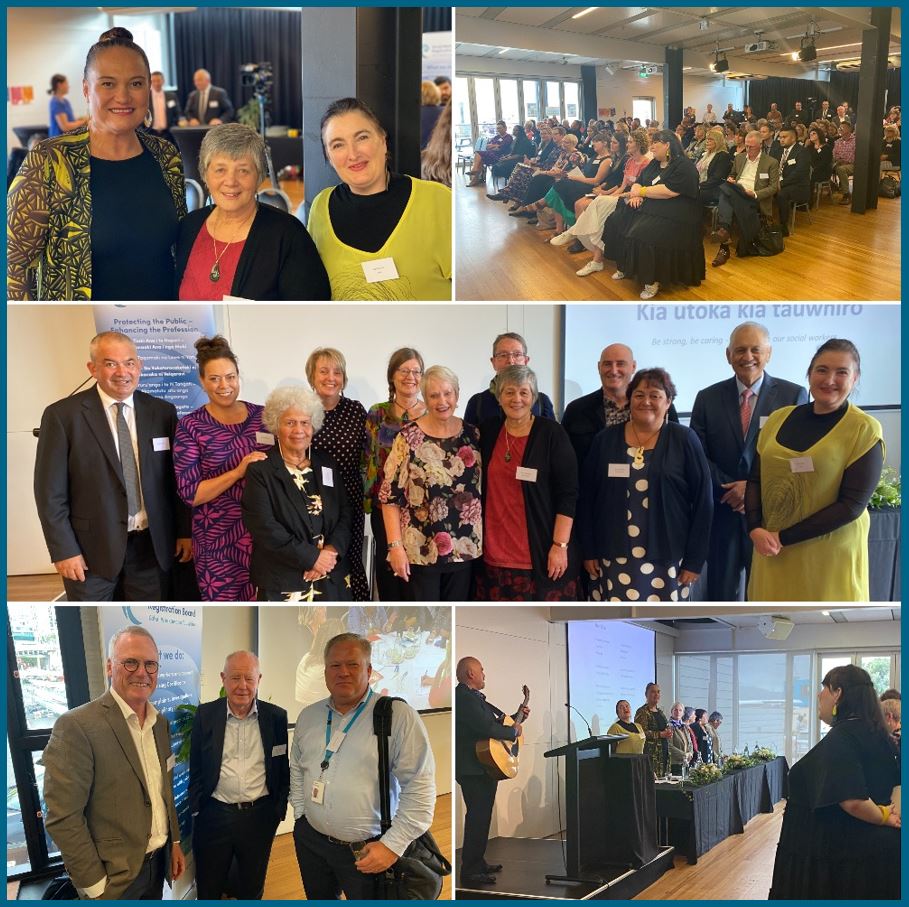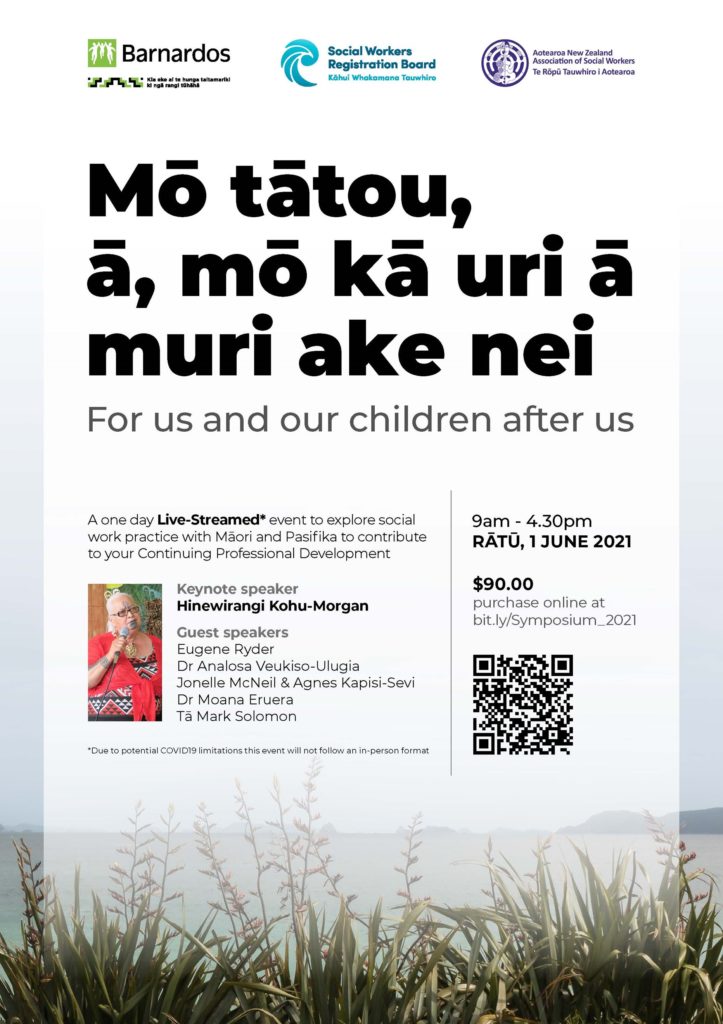
It was wonderful to see so many social workers gather together last month to celebrate the implementation of mandatory registration at an event held on World Social Work Day. Minister Carmel Sepuloni was the keynote speaker and she spoke highly of the resilience, ongoing mahi and compassion shown by social workers over this last year. The SWRB Chair Shannon Pakura, the heads of the professional bodies, National spokesperson – MP Louise Upston and former Minister Steve Maharey also spoke about New Zealand marking this milestone and all that it meant.
All had very interesting perspectives on what mandatory will bring and what is needed for the profession to succeed in a professional environment. The event was recorded so I’d encourage you to have a look at what was said here.
As the regulator, the SWRB is also addressing what needs to happen as we transition into this mandatory environment, including the challenges we face and the potential opportunities.
In a mandatory environment we apply a public safety lens – the regulatory framework under which social workers and the sector operates, and which builds public trust in the profession. This will be the focus of our work in the year ahead – strengthening social worker professionalism through using a wider range of tools, such as regulatory guidance & practice notes, information, and trends.
We are sometimes asked what the Practising Certificate and Disciplinary Levy pay for – and it’s all of this work, along with what we already do such as:
- Answering the thousands of enquiries we get through email and phones about registration, supervision, CPD, and seeking practice advice
- Providing practice and regulatory advice – our two social work advisors and our Chief Advisor social work are busy providing advice one on one or through our Zoom sessions
- MySWRB CPD log
- Policy is developed by the SWRB with the sector including:
- The Scope of Practice
- Mandatory reporting (serious misconduct, competence & health)
- Revising the Code of Conduct
- The SWRB website, Facebook and any engagement (over the last two years, the information campaign was funded by a Government Budget bid, not by social workers).
There has also been a big increase in the number of concerns and complaints over the last two years; they’ve doubled from 42 to 84 and all need assessing and for some, further investigation so it’s been a very busy time. On the plus side, it shows the regulatory system is working and your reputation as a social worker is protected as we take action to reduce unprofessional behaviour.
Being in a mandatory environment will bring many changes and challenges where we aim to enhance professionalism by providing the social work profession with regulatory support, tools, and guidance. The first of these is below which is about what social workers can learn from Tribunal decisions. The tools and guidance will help support the vital work done by the sector and see social work recognised and valued as a profession.
Sarah Clark
SWRB Chief Executive
Practising Certificate round to open slightly later
We are shifting the opening of the Practising Certificate round as we move the renewal process to the new database, MySWRB. Please note, you won’t see an option to renew your Practising Certificate on MySWRB until the round opens.
Can I still use RSW as part of my signature?
We’ve recently been asked by a registered social worker who has a role by a different title whether or not she can still use RSW as part of her signature in a mandatory environment. You are welcome to use RSW and we would encourage it. It’s great to see social workers wanting to stand with their profession!
Social work learning from Tribunal case
Our social work team at the SWRB has had a look at the outcomes of a recent case heard by the Social Workers Complaints and Disciplinary Tribunal and we wanted to share our learning with social workers in the field.
The Tribunal is reserved for the most serious disciplinary cases. A Professional Conduct Committee (PCC) sends charges to the Tribunal if it believes a social worker is guilty of professional misconduct or of conduct unbecoming of a social worker.
The Tribunal recently considered a charge against a registered social worker, who was convicted in the District Court of two drug offences, including supplying methamphetamine to a client for whom he was the approved caregiver. The social worker was censured and his registration was cancelled.
The case highlights a number of incidences where Principle five of the Code of Conduct has been breached. Our team’s interpretation of Principle five is that it requires social workers to promote the needs of a client by ensuring they never abuse, neglect, harm or exploit clients in any way. That means social workers can never engage in any action that demeans the dignity of a client or misuse their power in the client practitioner relationship.
Our team’s interpretation of Principle one of the Code of Conduct is that it requires us to act with integrity and honesty to maintain our professional boundaries by being reliable, dependable, and trustworthy. By doing so we enhance public trust and the trust of our often-vulnerable clients and their family, whānau and communities. The public have an expectation that they can place their trust in social workers, that they will be properly cared for and their safety will be protected.
In situations, such as this recent case, where a social worker has supplied drugs to a client and/or has engaged in a relationship beyond the boundaries of a professional role, they risk being censured and/or suspended or having their registration cancelled of registration. Regardless of the mitigating factors a social worker may face in their own lives, they need to ensure they are referring to the Code of Conduct when deciding what actions are appropriate or inappropriate.
Our reflection as social workers come from being in a regulatory space; we are not providing a legal opinion or a summary of Tribunal findings. As social workers we have a kete full of tools for our practice, the SWRB Code of Conduct, ANZASW Code of Ethics, supervision, and ongoing professional development that support us to uphold the safety and wellbeing of others while also enhancing social work professionalism.
Workforce survey – telling the social work story

The annual workforce survey of registered social workers took place in May/June 2020. This was the third year of the survey which is a useful tool to highlight recurring themes and issues for registered social workers across Aotearoa New Zealand.
The results support advice we give to government decision-makers and stakeholders, and enable us to report on workforce composition and trends. They are also useful to stakeholders, such as ANZASW, who lobby on issues such as pay equity and educators who use the material in their social work courses.
The information collected from the 1,049 social workers who responded was anonymous and divided into five sections: demographics, employment, your qualifications, income, and five-year intentions.
We learnt that:
- 20% of respondents had a title other than social worker or social work in their job description
- 75% of respondents were contracted to work between 31 and 40 hours per week, but 60% of those were working more than that
- Almost 70% of respondents were planning to continue working in social work,
- of those intending to leave the profession, 45% cited pay scale and 24% cited workload as their reasons.
It’s really helpful information and we want to understand trends and future needs of the workforce. You can find the SWRB Workforce Survey report 2020 here. We will be including the 2021 survey as part of the Annual Practising Certificate round and hope that as many of you as possible will participate.
SWRB appointed lead agency on workforce planning
The SWRB has been appointed to act as the lead agency on workforce planning following a recent Cabinet decision.
There are thousands of social workers employed across 600 NGOs and 80 public sector agencies, spread across fields from health to child statutory protection to the community and voluntary sector. The workforce planning role will look to understand emerging issues and provide an overview and strategic response to challenges of supply and demand.
The SWRB’s Chief Executive Sarah Clark says, “The establishment of a lead agency for workforce planning is an indication of the recognition by government of the value and contribution of the social work workforce.”
In delivering workforce planning, the SWRB will initially focus on building evidence on the challenges facing the social worker workforce as a whole. The next step will be to develop, promote, and monitor a workforce strategy and plans to address issues and report on progress, working across the sector.
“Workforce planning fits well with the move to mandatory registration, and signals that the profession is entering a new phase in terms of its recognition and status. We are building on the insights we have already gained but with much more work to do,” says Ms Clark.
The SWRB will be engaging with the sector on the issue.
Symposia – exploring social work practice with Māori and Pasifika
Save the date in your diary for the Symposium being held on 1 June 2021. We will have six dynamic Māori and Pasifika speakers who will share their life experiences, research, and practice knowledge with the sector.


